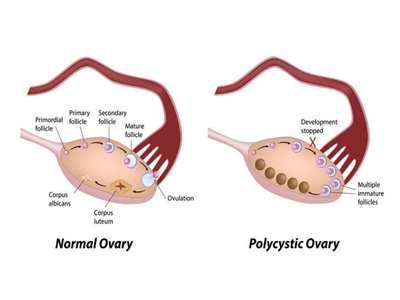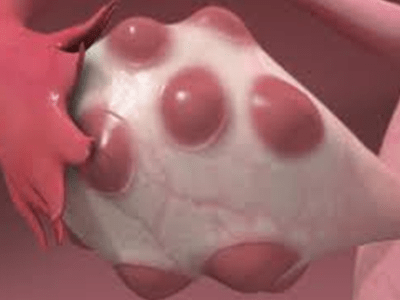Polycystic Ovarian Disease (PCOD), also known as Polycystic Ovary Syndrome (PCOS) is a very common condition affecting women during childbearing age(12 to 45); today one in five women suffer from PCOS problem.

PCOD is a condition characterized by the presence of multiple cysts in the ovary along with a major imbalance in sex hormones. It leads to suppressed or irregular menses, scanty menses, weight gain, acne, body hair and has many psychological repercussions too.
In polycystic ovary disease, there is an imbalance in hormones of brain (hypothalamus and pituitary) and ovaries. In PCOS, ovaries don’t get the right signal from pituitary. L.H levels are too high that it does not allow ovary to release egg. Eggs in the follicles do not mature and are not released from the ovaries. Instead, they form very small cysts in the ovary- hence the name polycystic ovaries.
In the uterus, uterine lining continues to proliferate due to lack of signal for shedding.
All this process results in the absence of menstruation or irregular menstruation and heavy menstrual bleeding.
Studies show that PCOS runs in families. Immediate relative like mother or sister with PCOS have 50% more chance of having the disease. Women with family history of type 2 diabetes also have high risk.
- INSULIN RESISTSNCE & LIFESTYLE Insulin resistance means that cells of the body are showing insufficiency in using insulin.
- Insulin resistance as a result of genetic factors
- Insulin resistance as a result of being overweight (related to diet and inactivity)
- A combination of both of these factors
SIGN & SYMPTOMS
- Irregular menses
- Heavy menstrual bleeding
- Obesity: women with PCOD have difficulty in losing weight.
- Excessive hair growth on the face, chin, or parts of the body where men usually have hair. This is called “hirsutism.” Hirsutism affects up to 70% of women with PCOS
- Acne
- Skin tags , which are small excess flaps of skin in the armpits or neck area
- Excessive thinning of hair
- Dark patches on skin creases like neck, groin and under the breast.
- Depression and Anxiety
- Decreased libido
- Fatigue
- High level of androgen
- High cholesterol
- High level of insulin
Diagnosis is based upon the combination of clinical findings, ultrasound and laboratory features.
TREATMENT
The goal of treatment is to treat the patient holistically i.e. all the symptom of PCOS improves simultaneously weather it may be menstrual irregularity, hirsutism, obesity, depression or any other associated complaint. You do not have to take different therapies and treatment for each of your symptom.
Our constitutional treatment will help balance hyperactivity of the glands, regulate hormonal balance, dissolve the cysts in the ovaries and force them to resume normal functioning . This can significantly increase the chances of conception. The different expressions of this disease can be managed effectively, safely and gently without any side effects with our remedies.

